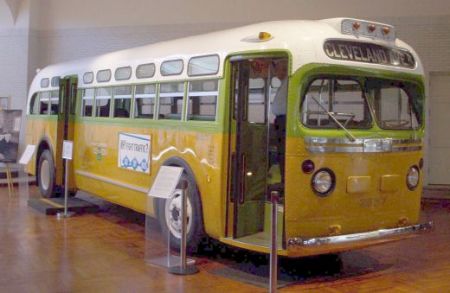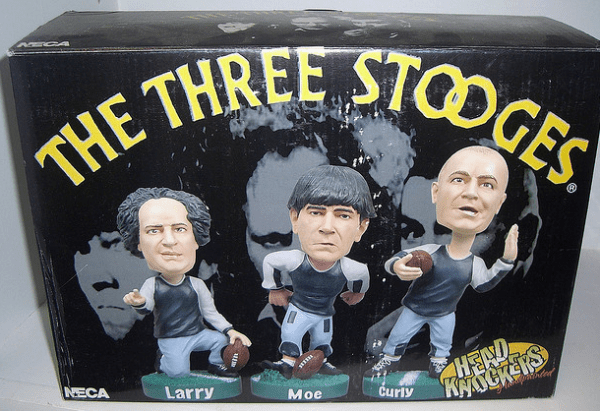Some people, like Abraham Lincoln, freed the slaves in North America, making history as a result by changing the world for the better. Others do so unwittingly. Here, Pepper regales his daughter with the first part of his humorous tales about them.
Dear Paprika,
Here are some funny stories about nitwits who changed history without realising it.
South Africa’s Nitwit: A Railway Official
Once upon a time, there was an Indian man who was travelling in a first-class train compartment in South Africa in 1893. An European entered the compartment, saw the Indian man, and sent for a railway official. The railway official ordered the Indian man out. He was then commanded to sit with the other coloured people in the lower-class compartments of the train. Those were the days when the ‘whites’ had dominion over ‘coloured people’. Coloured people were considered low-class, unfit to share a train compartment with white people. The Indian man protested and insisted he had a right to be in the compartment since he held a first-class ticket. The railway official then forcibly threw him out onto the railway platform for disobeying him.
This scene has probably happened before. After all, coloured people were often mistreated by the whites. Yet, for the railway official, it was probably just another day of ridding coloured troublemakers from the train. A day of ‘doing his job’.

It was on a very cold winter’s day that the Indian man sat on the platform. He thought of the centuries of racism and the unfair treatment of coloured people by the whites. Eventually, he soldiered on in the fight for the civil rights of Muslims and Hindus in South Africa. Years later, he was instrumental in freeing India from British colonial rule. Who was he? He was none other than Mohandas Karamchand Gandhi.
I imagine it must have been a bitter day for the British Empire when it had to give up India, the jewel of its crown. For nearly a hundred years, the British had helped themselves to the riches and resources of India. Lording over the Indians until Gandhi achieved independence for the nation.
Best of all, Gandhi has the railway official to thank – yes, the fellow who threw him out of a train! Had he not been mistreated that fateful day, he might simply have practised law quietly in South Africa, thousands of miles away from India. It was that defining incident that had led to Gandhi’s championing of non-violent civil disobedience which brought India her freedom in 1947. An event that also triggered the achievement of national independence by other countries under British rule, Malaysia included.
Today, the British Empire is no more. All because a railway official ‘did his job’. Who was this nitwit? No one knows, actually. I suppose only said nitwit himself knows what he did to Gandhi on that cold winter’s day. I wonder how he felt when he realised it was his singlular action that had caused the eventual downfall of such a mighty empire. I wonder if he locked himself indoors, afraid that people would point to him and say, “You! You’re that domino that brought the downfall of our proud empire!” or “What took our nation to build over centuries, you single-handedly destroyed in fifty years!”
Power and Corruption

Dear Paprika, for some odd reason, people in power think they will always be in power. They think it is all right to treat others unfairly. Don’t these people know that everything must come to an end eventually? Empires come and go. Leaders and their power, too.
Moreover, it is only a matter of time before the proverbial straw breaks the camel’s back. Who knows which ‘straw’ will trigger the end?
I do not know or understand why a man would treat his fellow man unkindly. Until today, there are still reports of people being abused: Bangladeshis abused by Arab teenagers, Indonesian maids abused by their Malaysian employers, LGBT people abused by homophobes and children abused by priests.
Who will be the next nitwit who causes the unexpected end of a mighty empire?
America’s Nitwit: A Bus Driver from Alabama
At one point in the history of the USA, the outlook was not good for coloured people even though slavery had been abolished more than a hundred years ago. After the Civil War, they lived under racial segregation laws that separated the whites from coloured people. The latter, although citizens of the USA, were treated as lower-class citizens. They did not have rights to higher education, equal job opportunities and other fundamentals. For many years, coloured leaders tried to change the system but to no avail.
A bus driver changed it all in 1955.
James F. Blake from Montgomery, Alabama, was that bus driver. In those days, passengers on buses in Montgomery were segregated; the whites sat in front while coloured people took the seats in the back. Coloured people would embark via the front entrance, pay their bus fares like everyone else, and then exit the bus only to reenter again through the back entrance! Bus drivers had the power to unfairly demand coloured passengers to give up their seats to white passengers. Sometimes, they bullied coloured passengers by driving off before they could get on after paying their fare!
One day, Blake demanded that four coloured passengers gave up their seats to some white passengers. To him, it was probably just another day of – yes, you’ve got it – ‘doing his job’ because he had the power to do so. Three passengers complied. The fourth, a lady, refused. She was tired of being pushed around unfairly. She stayed put. Blake threatened to call the police. You can imagine the pressure at play at that moment – the bus is stationary because the driver is trying to unseat a stubborn lady while the passengers, packed on the bus, are impatient to go home. I imagine some of them must have jeered and shouted at her even as she refused to budge, “Oi! Get up, stupid! You’re holding up the bus, black bitch!”

As the story goes, Blake called the police who promptly arrested her. I think you can already guess who that lady was: Rosa Parks. Rosa was a nobody until her arrest over a simple dispute involving seats on a bus. In less than a year, her ‘disobedience’ led to the dismantling of segregation laws on buses by the Supreme Court and sparked the American civil rights movement before putting to death racial segregation laws across the board and throughout the USA.
I wonder if Blake’s bus-driving colleagues made him an outcast as a result. After all, on their buses, these drivers were kings. They could refuse to admit passengers, demand that passengers get off, compel passengers to sacrifice their seats (and stand throughout the journey), and even drive off as coloured passengers are boarding. These were powers and authority they lost along with Rosa Park’s civil act of disobedience.
Today, a bus driver who behaved as Blake did would be fired from his job. Yet, sadly, the nitwit we know as Blake was not remorseful for his actions. He tried to portray himself as being innocent by claiming that he was only obeying the law. He had obviously not heard of Saint Augustine‘s famous quote: “An unjust law is no law at all.” You on the other hand may be more familiar with Martin Luther King’s version: “One has not only a legal but a moral responsibility to obey just laws. Conversely one has a moral responsibility to disobey unjust laws.”
Anyway, Paprika, I will continue with more funny stories in another letter. For now, be good and try your best to excel in anything you do.
Your loving father,
Daddy
(Featured image accompanying article on main page courtesy of Mike Overall, source: http://bit.ly/MCG41z)


Will there be a special part on nitwits in our country? =)
Nice and may I add, much food for thought. Awaiting patiently for part 2,3,4…?